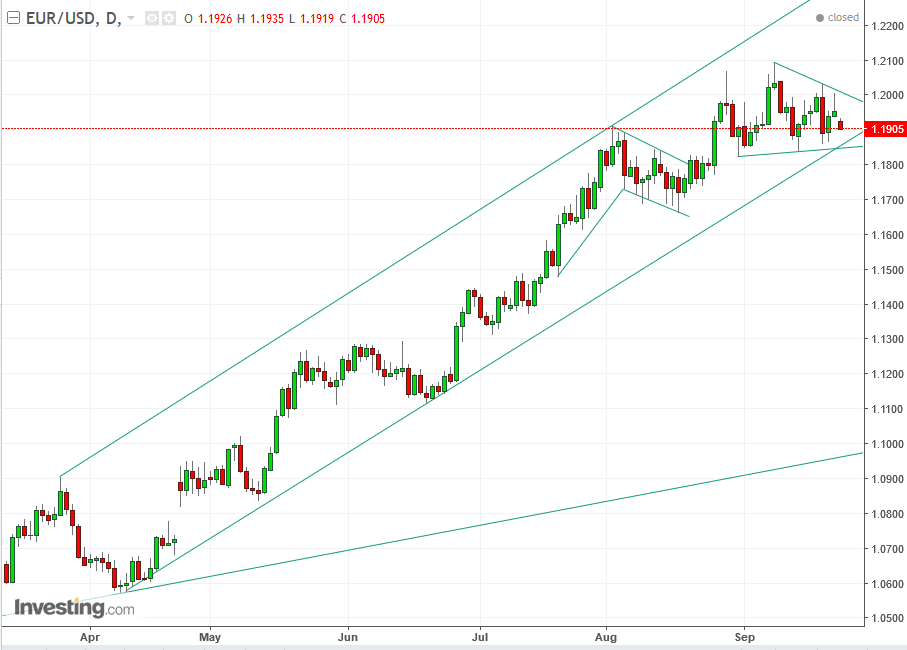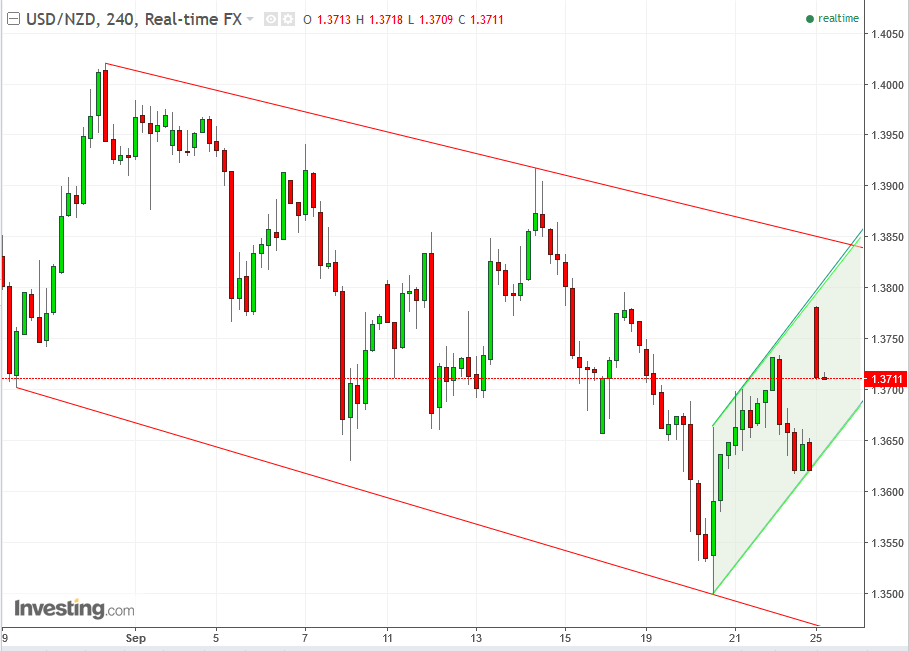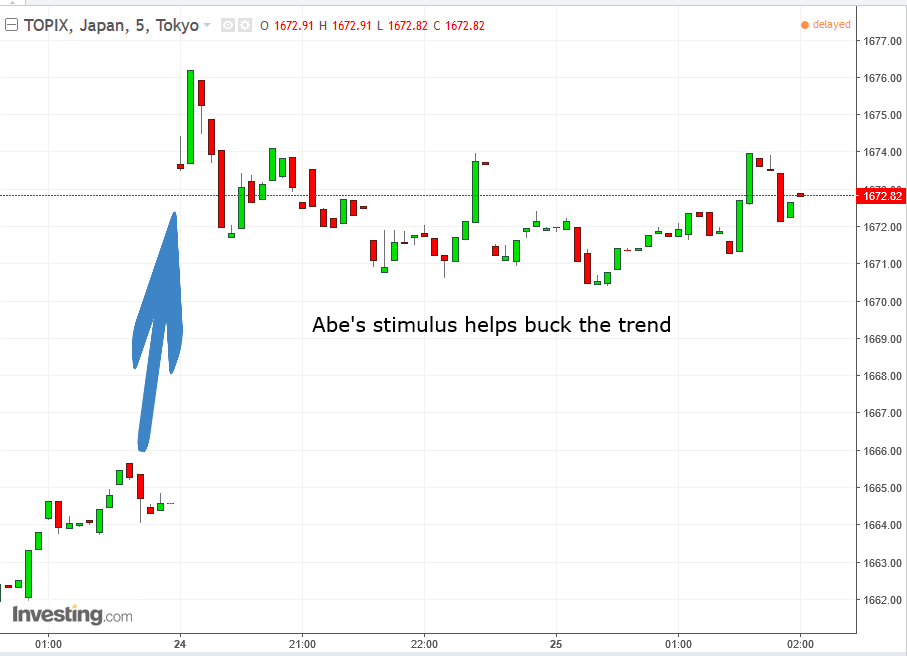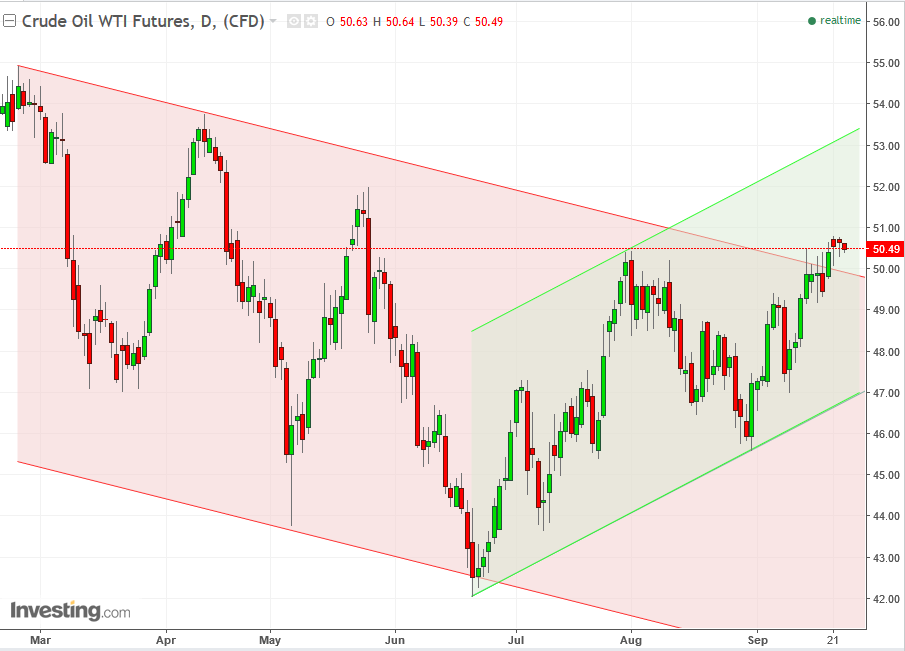by Pinchas Cohen
Key Events
Geopolitics appears to have finally caught up with investors. Last week, metals fell on China’s downgrade, and stocks fell on North Korean tensions. Today, the euro is slipping on German politics.
Merkel’s Non-Victorious Win
While Chancellor Angela Merkel’s historic fourth term would normally have increased German and eurozone stability and therefore market certainty, her win wasn’t a total victory. She lost 20 percent of the votes she garnered during the 2013 election, even as low unemployment and the country's strongest economic growth since the financial crisis should have been a boon to Merkel's center right Christian Democrats.
Perhaps worse than the loss of votes to the CDU/CSU is the party that gained traction at the expense of the CDU and the country's second largest party, the Social Democrats or SPD. Some might argue the real victors may have been the far-right, anti immigration, Alternative For Germany (AfD) party which is now the third strongest party with more than 13% of the vote.
For the first time since WWII a far-right party will have representation in the country's legislative body the Bundestag. This comes after Austria’s presidential election at the end of last year, in which the far right, led by Norbert Hofer, became a viable alternative to the establishment, the first time this has happened since WWII.
Germany’s far-right party gaining power, less than a year after Austria’s provides a chilling historical parallel to Austria’s Adolf Hitler sweeping Germany off its feet in the 1930s.
The electoral results in Germany may mean that Merkel will be unable to form a viable coalition for months, introducing considerable uncertainty for the single currency.

The EURUSD pair has traded sideways since August 29. Will it break out of its congestion to the upside, resuming its uptrend, or to the downside, forming a reversal? Hard to tell.
One thing is all but certain however: any development—or rumor—involving Merkel’s coalition negotiations is going to have a strong impact on the currency. Expect volatility to return to post-Brexit levels.
Global Financial Affairs
Another asset on the receiving end of a political blow is the New Zealand dollar, which lost as much as 1.2 percent but has pared its fall to 0.7 percent, after the country’s ruling party failed to secure a majority in a weekend vote, triggering what is weeks of coalition negotiations.

The USD/NZD pair has been trading within a rising channel since The Fed’s Wednesday meeting, but within a descending channel since August 31. The pair’s trajectory is to rise to 1.3800 and then turn back down to retest 1.3500.
Japan Shares Buck Trend
Asian stocks continued Friday's US decline. Chinese property developers weighed heavily on Hong Kong shares, after China’s credit rating downgrade last week.

Japanese investors broke away from the regional trend, on Abe’s proposed 2 trillion-yen ($18 billion) stimulus, ahead of an expected snap election, to take advantage of growing support based on his handling of the North Korean crisis.
The stimulus will send the yen into a decline, which will boost exports and therefore the stock market. It will also make Japanese stocks cheaper for foreign investors.
While some investors may still be on the fence regarding risk, Federal Reserve Chair Janet Yellen and European Central Bank President Mario Draghi may pull them back or even push them to safe havens.
Europe equities are meandering this morning after shares in Asia and developing markets declined.

Oil is down 0.28 percent after paring a 0.50 decline. A close at this level would confirm yesterday’s bearish “hanging man,” forshadowing the decline suggested in yesterday’s Week Ahead. Furthermore, with the peak from last week overcoming the August peak by only 0.77 percent, it may prove to be a bull trap, and the correction may turn into a resumption of the initial downtrend since February. That would be the call with a break of the August 31, $45 low.
Up Ahead
- Draghi addresses EU lawmakers in Brussels on Monday. Yellen speaks in Cleveland on Tuesday. Later in the week, Bank of England Governor Mark Carney speaks, as does Fed Vice Chairman Stanley Fischer.
- European Union chief Brexit negotiator Michel Barnier and U.K. counterpart David Davis begin their next round of negotiations.
- Household spending last month in the U.S. probably posted the smallest gain since February as motor vehicle sales shifted into a lower gear, economists forecast government figures to show.
Market Moves
Stocks
- Japan’s TOPIX index advanced 0.5 percent at the close in Tokyo.
- Australia’s S&P/ASX 200 Index ended virtually unchanged and South Korea’s KOSPI slid 0.4 percent.
- The Hang Seng Index in Hong Kong fell 1.2 percent with Chinese property developers slumping after several cities on the mainland tightened rules on home sales.
- S&P 500 Futures were little changed in early European trading. The underlying gauge closed up 0.1 percent on Friday.
- Contracts on the Euro Stoxx 50 declined 0.3 percent.
- New Zealand’s S&P/NZX 50 Gross Index rose 0.7 percent.
- The MSCI Asia Pacific Index declined 0.4 percent.
Currencies
- The yen slid 0.2 percent to 112.23 per dollar, kicking the week off on a down note after recording declines over the past two weeks.
- The euro slid 0.3 percent to $1.1921.
- The kiwi dropped 0.8 percent to 72.69 U.S. cents.
- The South Korean won advanced 0.5 percent to 1,131.50 per dollar.
- The British pound climbed 0.4 percent to $1.3560. It dropped 0.7 percent last week after disappointment at the lack of Brexit details from Prime Minister Theresa May.
- The Dollar Index was up 0.25 percent to 92.43.
Commodities
- West Texas Intermediate crude lost 0.2 percent to $50.56 a barrel.
- Gold lost 0.4 percent to $1,292.32 an ounce.
Bonds
